| Reviews & Columns |
|
Reviews DVD TV on DVD Blu-ray 4K UHD International DVDs In Theaters Reviews by Studio Video Games Features Collector Series DVDs Easter Egg Database Interviews DVD Talk Radio Feature Articles Columns Anime Talk DVD Savant Horror DVDs The M.O.D. Squad Art House HD Talk Silent DVD
|
DVD Talk Forum |
|
|
| Resources |
|
DVD Price Search Customer Service #'s RCE Info Links |
|
Columns
|
|
|
Eric Rohmer's Six Moral Tales: Criterion Collection
The Collection:
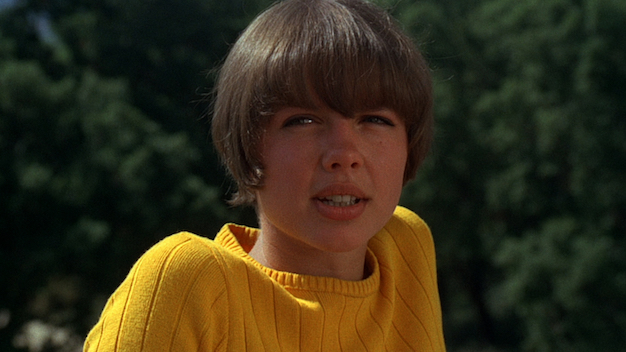
For all of the formal invention in cinematography and editing that came with the ascendance of the French New Wave in the '60s, French films of this movement are often pretty chatty. Hollywood films favor the storytelling mode in which action comes first, and any character development comes out of that action; the French New Wave's retort is, "Why don't we talk about it?"
The New Wave filmmaker best known for his talk is Éric Rohmer. Many of his films offer their protagonists the privilege of voice-over, although smartly these inner monologues often complicate the viewer's reaction to these characters rather than simplify it. He also allows characters to converse, as one would overhear in life; every line spoken is motivated, but they are not all necessarily "going somewhere." Filmmakers like Rivette and Godard love to reference classic French writing and seem to tug cinema in the direction of analytical theory; meanwhile, Rohmer pulls it into the realm of humanist philosophy.
This is not to say that Rohmer's films are devoid of drama; a lively argument with your best friend, for example, is not devoid of drama either. But Rohmer seems to hesitate at putting his characters through a contrived plot. He'd rather see the way in which their talk and their ideas direct them on their path. That's the fundamental notion behind his best-known series of films, Six Moral Tales, adapted from his own collection of stories. The "moral" described is not societal morality, but each main character's own prescribed way of living, his own "moral code." Big life lessons are rarely learned in these tales, and when they are, they certainly don't have the stink of feel-good sentimental pabulum.
The shared general outline of these six stories -- which Rohmer later admitted, he didn't even realize was so similar until all six were written -- is as follows: a man is in love with one woman, he spends the majority of the film in the company of a different woman he might love instead, finally he returns to the first woman. But that framework is just a framework; each film departs from that outline in ways that are even more engrossing and delightful when you're aware of it. For instance, in the third film in the series, each character is wrapped up in a love triangle of their own, turning the stories' typical love triangle into a love nonagon. The fifth film involves flirtations with numerous women because the main character knows that, in a month, he is going to get married. Oddly, the sixth film is the only one that deals with marital infidelity, showing that there are numerous ways for people to become romantically entangled and disentangled without transgressing society's morality. Hey, maybe these are sort of about morality after all.
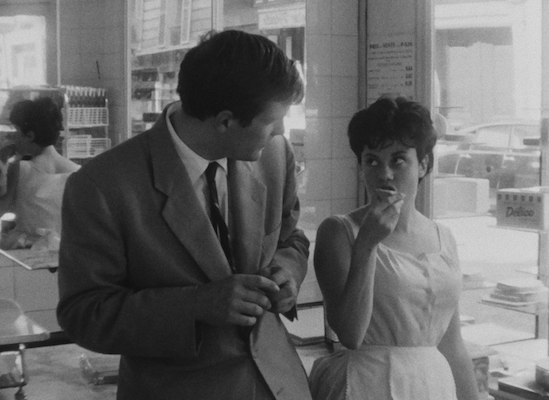
The first two films in the series, The Baker Girl of Monceau and Suzanne's Career (both 1963), are the shortest (25 and 55 minutes in length, respectively) and probably the most flagrantly ironic. They both concern college-age men whose "love" better resembles romantic obsession and whose claim on the women with whom they are fascinated is tenuous at best. In the first film, the young man is played by future director Barbet Schroeder (although his voice is dubbed by future director Bertrand Tavernier to get the proper snobbishness). He tracks a cute blonde woman that he'd like to date, but gets waylaid in a nearby bakery. Noticing the bakery girl thinks he's cute, he decides to convince her to go out with him, almost as an idle pastime while he waits for his real love. In the second film, young Bertrand (Phillippe Beuzen) tracks the up-and-down relationship between his womanizing pal Guillaume (Christian Charrière) and the smart and sweet Suzanne (Catherine Sée). Guillaume not only mistreats Suzanne but sponges off of her, encouraging "nice guy" Bertrand to do the same.
I was not surprised to see Neil LaBute offering an appreciation of Rohmer in the bonuses of this collection, because these first two films must have been particularly instructive. The way these male characters, who think nothing of their behavior, subtly terrorize the women in their life for amusement or to stave off boredom definitely found a new home in LaBute's work. In fact, the dynamic in Suzanne's Career, where Bertrand sees himself as a "nice guy," even though he secretly cheers Guillaume's abuse on, is the direct model for LaBute's debut, In the Company of Men. And while I don't think Rohmer is cheering these men on, their type is so toxic that I found their misbehavior here less wickedly pleasurable or secretly instructive than just offputtingly gross.
While Rohmer's men don't necessarily get "better" as the films go on, their ability to damage the women in their orbit is less harrowing, which makes the later films easier for this viewer to take. (One can reasonably argue that Suzanne makes it out better than the scheming men in her film, but that speaks more to her strength than to the men's level of malice.)
The number three movie in the series, My Night at Maud's (1969), was actually shot and released fourth, due to financial and scheduling issues, but its black-and-white photography and city setting make it feel like a more natural progression from the first two films. Jean-Louis Trintignant is a Catholic engineer who spots a pretty blonde woman, Françoise (Marie-Christine Barrault), at mass but can't quite approach her. When he starts seeing her in other places, he becomes certain that they are destined to be married. But before he can talk to her, he runs into an old friend, Vidal (Antoine Vitez), who asks Jean-Louis to visit a girlfriend of his, Maud (Françoise Fabian). This leads to the centerpiece of the film, in which Jean-Louis, Maud, and Vidal lounge around Maud's apartment, discussing love, religion, and philosophy. Eventually, Vidal says he has to go, and Maud demands that Jean-Louis stay and continue talking -- while she slips into bed.
My Night at Maud's is the most aggressively talky and slow-paced of the six films. Rather than resort to typical shot/reverse-shot editing patterns, Rohmer will hold close-ups as one person speaks and listens for a full minute before cutting. I will admit that I tried to watch this film when I was much younger, and I gave up. I already liked some other Rohmer films, but I just didn't care for an in-depth discussion of Blaise Pascal's religious philosophy. It's a shame I stopped then, because it turns out that not only does the Pascal talk give way to more palatable scenes about romance and betrayal, but -- hey! -- the Pascal even informs those later scenes thematically. What at the time looked like a pretentious variation on simplistic dialogue-forward Kevin Smith-style filmmaking, with Pascal subbed-in for Star Wars references, now obviously looks like a carefully executed exploration of what cinema can express when you don't move the camera and you don't overcut. It's pretty damn rewarding.
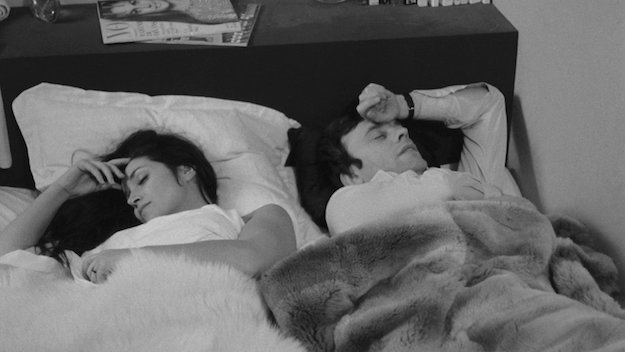
The fourth-numbered/third-released film, La Collectionneuse (1967), is our first entry in color and the first set outside the city. This film was the most financially successful of the series, one presumes partly because it's so pleasing to look at. Néstor Almendros's photography makes the French countryside -- and the attractive young people inhabiting it -- look irresistible. La Collectionneuse, while philosophically not too far divorced from Suzanne's Career, at least gives relatively equal firepower to all combatants in this battle of the sexes. Art dealer Adrien (Patrick Bauchau) goes to his friend's vacation house to escape the world, with only his artist pal Daniel (Daniel Pommereulle) to keep him company. Hitch is, the house owner left behind one of his romantic conquests, a young looker named Haydée (Haydée Politoff). At first convinced she's an easy girl who is beneath a man like him, Adrien slowly thinks maybe Haydée is an easy girl who is just right for a man like him.
Browsing reviews online, La Collectionneuse might oddly be the most polarizing entry in the series. While certain moments are undeniably sour, including a weird jealousy-stoking game between Adrien and Haydée near the end that feels more like a literary device than understandable human psychology, these moments are mostly a side-effect of Rohmer's uncomfortably acute perceptiveness. And as a rule, that perceptiveness enriches his films and arguably makes them more compelling with each successive entry.
The series' fifth film seems, at first blush, like the most gimmicky. Claire's Knee (1970) takes its title from the highly focused obsession of its main character, Jérôme (Jean-Claude Brialy), who feels compelled to consensually touch the knee of an acquaintance's teenage daughter. "It would be better than seducing her," he suggests. But actually, the knee fetish crops up quite late in the film. The plot, as it were, is more multi-faceted. Jérôme's old friend Aurora (Aurora Cornu) is vacationing in the same village where Jérôme is trying to clear out and sell an old family house before he gets married the following month. Aurora is an author strapped for inspiration, so she suggests little romantic experiments for Jérôme to enact that she could potentially write about. The first experiment involves indulging the crush of his landlady's 15-year-old daughter Laura (a bracingly intelligent and vivacious Béatrice Romand), which inadvertently leads to Jérôme's fascination with the knee of Laura's slightly older half-sister Claire (Laurence de Monaghan).
It's not exactly sowing wild oats (or "faire les quatre cent coups," to name-check another New Wave classic), but Claire's Knee is a circuitous exploration of Jérôme's last gasp as a bachelor. The character acts like none of these romantic encounters -- including the supposedly platonic ones with Aurora -- can affect him, because he's as good as married, but Rohmer's film subtly suggests that he agrees to Aurora's plan because he is still fumbling toward certainty and satisfaction with his decision. Ultimately, Jérôme happily convinces himself that he has a better understanding of love than these teenagers, but Rohmer's ending grace note slyly demonstrates otherwise.
The final film in the series is Love in the Afternoon (1972) (aka Chloe in the Afternoon; one presumes either to avoid confusion with the Billy Wilder film or to continue the pattern of having girls and women mentioned in the titles). A natural progression from Claire's Knee, where our protagonist was just on the verge of committing to marriage, this sixth tale examines what happens where a perfectly pleasant marriage nonetheless inspires one of the participants to indulge his wandering eye. We see businessman Frédéric (Bernard Verley) daydream about the women he sees pass by in his daily life, wondering about the parallel lives he could have had with them. Here, Rohmer indulges in a charming, out-of-character fantasy sequence, in which Frédéric encounters all the women from the previous feature films in this series and uses a magical amulet to seduce them.
When the opportunity presents itself in real life, Frédéric is much more nervous and hesitant than his fantasy self. An old friend's ex-lover, Chloé (Zouzou), comes back into his life, in search of work or friendship. Frédéric can't offer work, but he typically has afternoons free for them to meet up and... whatever. Their interactions are pretty platonic, but they steadily become more charged with the possibility of something romantic. A pattern that repeats throughout the Moral Tales is that Rohmer allows his protagonists to give in a certain amount to their desires before they come to their senses and realize who, per their own moral code, they should be pursuing. Usually, this amounts to an unguarded kiss. Love in the Afternoon is the only film in the series where the threat of the central couple consummating their fling feels highly possible, but at the same time this outcome would be intensely wrong.
As such, Love in the Afternoon is the most quietly fraught entry of the series. Rohmer cast Verley's real wife, Françoise Verley, which lends the husband-and-wife scenes an unforced honesty and a genuinely felt sadness. Their final scene together -- mixed with heartfelt declarations and a few conspicuous things left unsaid -- is not only an emotional culmination for the film, it closes up the whole series with an affecting and thoughtful button.
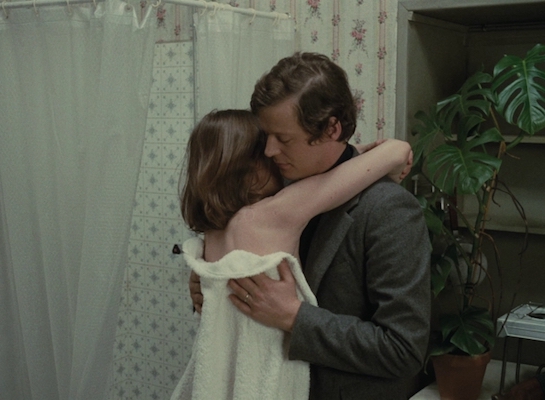
The Blu-ray
Criterion's Blu-ray set duplicates their 2006 DVD release, which means that rather than a simple one-off essay, we get a deluxe book with photos and 8 pieces of writing on the film, plus a paperback containing the original prose versions of Rohmer's Six Moral Tales. The six features and bonuses are presented on 3 BDs.
The Video:
In terms of clarity, these AVC-encoded 1080p 1.37:1 transfers are all excellent. The earlier 16mm shorts are a bit grainy, and there is an extended shot in Love in the Afternoon that looks optically zoomed-in or sourced from a dupey source, but for the most part, this is the clarity upgrade over Criterion's earlier DVD that one would hope for. I noted some reviews online that say the color films have a different color balance than the DVDs, skewing more teal and orange in places. Call me a philistine, but I wasn't particularly distracted by any of these shifts, nor was I bothered.
The Audio:
The French LPCM mono audio tracks (with optional English subtitles) aren't showy, but support the dialogue and atmosphere well. Rohmer stays away from score, but the sporadic snatches of music are folded into the mix well.
Special Features:
(1:23:49) - Barbet Schroeder interviews Eric Rohmer in 2006 about the series.
Final Thoughts:
Éric Rohmer is essentially a philosopher and a behavioral scientist masquerading as a filmmaker. He invests his films with astonishingly acute observations of the ways that men behave toward women, but he lets his characters speak for themselves. The Six Moral Tales are his signature work. Criterion's Blu-ray upgrade of their already excellent DVD set is essential viewing. DVD Talk Collector Series.
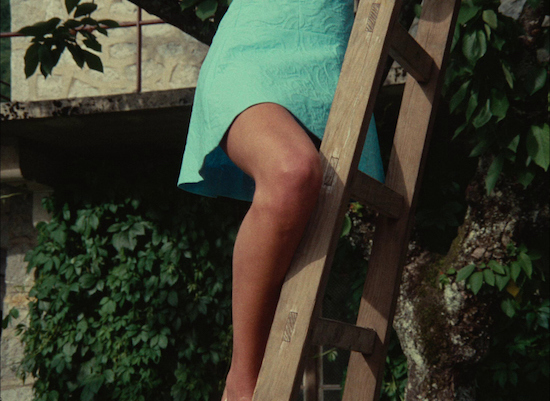
Justin Remer is a frequent wearer of beards. His new album of experimental ambient music, Joyce, is available on Bandcamp, Spotify, Apple, and wherever else fine music is enjoyed. He directed a folk-rock documentary called Making Lovers & Dollars, which is now streaming. He also can found be found online reading short stories and rambling about pop music.
|
| Popular Reviews |
| Sponsored Links |
|
|
| Sponsored Links |
|
|
| Release List | Reviews | Shop | Newsletter | Forum | DVD Giveaways | Blu-Ray | Advertise |
|
Copyright 2024 DVDTalk.com All Rights Reserved. Legal Info, Privacy Policy, Terms of Use,
Manage Preferences,
Your Privacy Choices | |||||||













